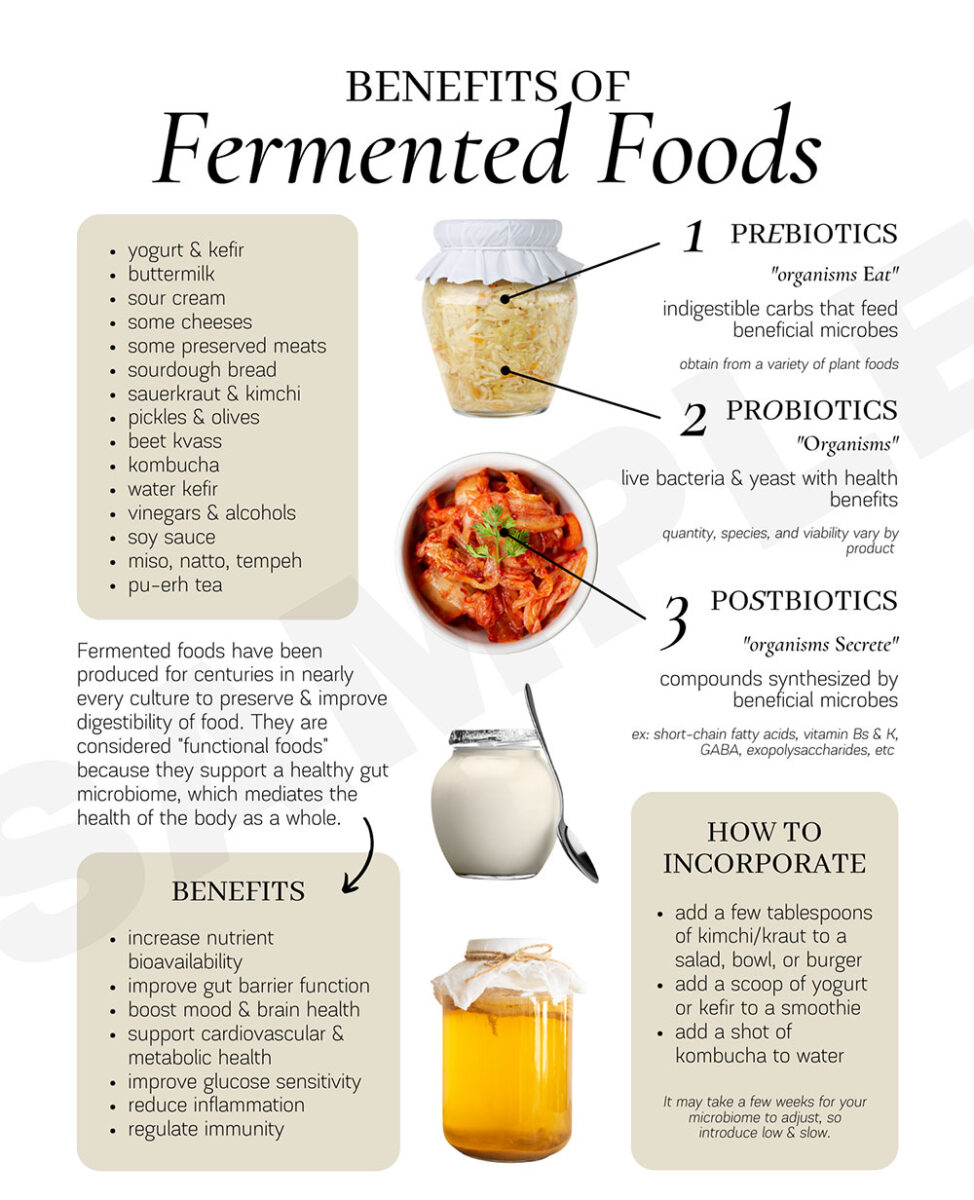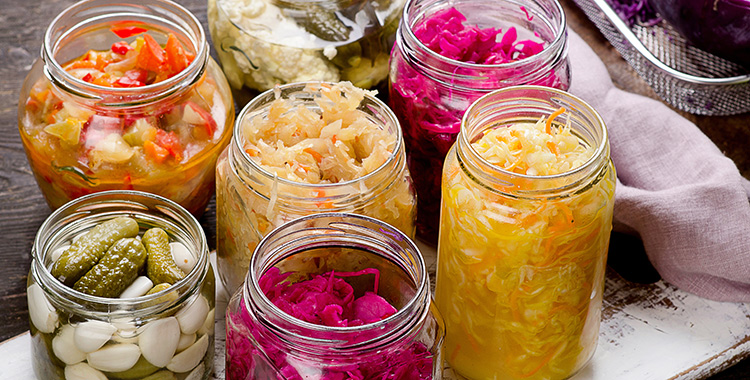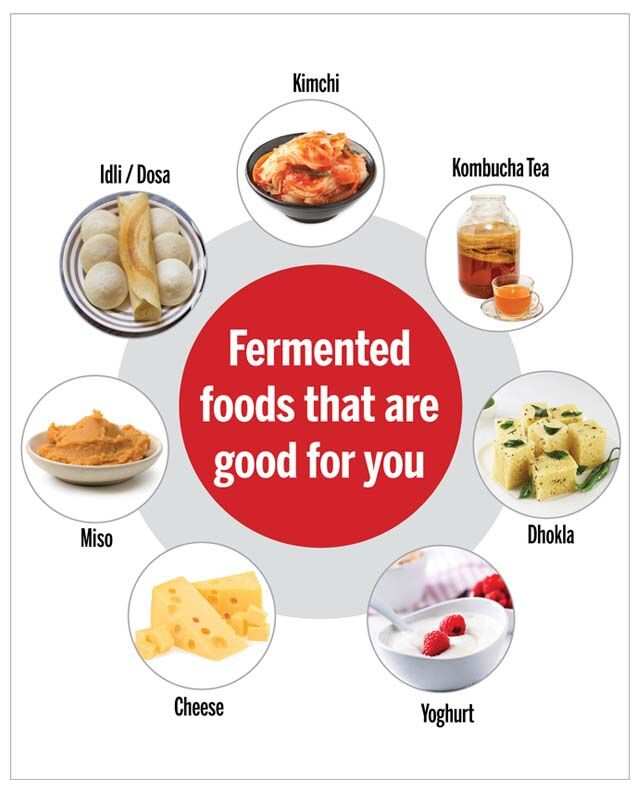Discovering the fascinating connection between our gut and brain can be life-changing. Fermented foods hold the key to this relationship, as they enrich your gut flora and significantly impact your mood. By incorporating probiotic-rich options into your diet, you can experience a remarkable boost in mental well-being. Imagine the potential of fermented foods not just as a delicious culinary delight, but also as a natural way to uplift your spirits and enhance your overall happiness. Let’s explore how these nourishing foods can transform your mood and contribute to a healthier, happier you.
The Surprising Link Between Gut Health and Mood
Many people underestimate the intricate connection between gut health and emotional well-being. However, research shows that the gut, often referred to as the “second brain,” plays a vital role in regulating our mood. Here’s how:
- Gut-Brain Axis: This complex communication network links your gastrointestinal system with your brain. It allows the gut to influence your brain chemistry and vice versa.
- Neurotransmitter Production: Did you know that about 90% of serotonin, the “feel-good” neurotransmitter, is produced in the gut? A healthy gut stocked with beneficial bacteria can optimize serotonin levels, potentially combating feelings of anxiety and depression.
- Inflammation Reduction: An unhealthy gut can lead to gut inflammation, which is linked to mood disorders. Fermented foods can help reduce inflammation and, in turn, bolster emotional health.
- Diverse Microbiome: A diverse gut microbiome enhances mental resilience. Consuming fermented foods like yogurt and kimchi can introduce beneficial bacteria, promoting a thriving gut ecosystem.
To sum up, nurturing your gut through fermented foods can significantly impact your mental health, leading to improved mood and emotional balance. Embracing this connection could pave the way for a happier and healthier life.

What are Fermented Foods?
Fermented foods are culinary wonders that offer a delightful and nutritious twist to our diets. At their core, they are products made through the process of fermentation, where microorganisms like bacteria, yeast, or molds transform food components into beneficial products. This process not only enhances the flavor and texture but also boosts health benefits, particularly for our gut.
Here are some popular examples of fermented foods:
- Yogurt: Creamy and probiotic-rich, yogurt supports a healthy gut.
- Kefir: A tangy dairy drink loaded with diverse probiotics.
- Sauerkraut: Fermented cabbage that’s rich in vitamins and gut-friendly bacteria.
- Kimchi: A spicy Korean dish made from vegetables that provide probiotics and antioxidants.
- K Kombucha: A fizzy tea that has gained popularity for its refreshing taste and gut-boosting properties.
What sets fermented foods apart is their unique ability to introduce live bacteria into your digestive system. These beneficial bacteria help maintain a balanced gut flora, which is essential for overall health. Consequently, including a variety of fermented foods in your diet not only aids digestion but can also have a positive impact on your mood, making them a powerhouse for mental well-being.
Incorporating these delicious foods into your meals provides a simple and effective way to nurture both your gut and your mind.
You can buy Brewing & Fermentation Fermenters from Amazon by clicking here.
Why Probiotics Matter for Your Mental Well-Being
Probiotics, the beneficial bacteria found in fermented foods, play a crucial role in maintaining not only gut health but also mental well-being. Here’s why they matter:
- Gut-Brain Connection: Research reveals a powerful connection between the gut and brain. The gut produces neurotransmitters, such as serotonin, which regulates mood and promotes feelings of happiness. Probiotics enhance gut flora, therefore supporting this link.
- Reduction of Inflammation: A healthy gut flora reduces inflammation, which is often linked to mood disorders like anxiety and depression. By consuming fermented foods, you can help modulate inflammatory responses, potentially leading to a calmer mind.
- Stress Reduction: Probiotics help lower cortisol levels, the stress hormone, leading to improved resilience against stressors. Incorporating fermented foods into your routine can create a natural buffer against daily stress.
- Mood Enhancement: Studies indicate that certain strains of probiotics can alleviate symptoms of anxiety and depression. Foods like yogurt, kefir, and kimchi are rich in these mood-enhancing probiotics.
In short, integrating fermented foods into your diet isn’t just a step for physical health; it’s a proactive approach to feel better emotionally. By focusing on your gut health, you’re taking charge of your mental well-being. Why not give it a try?
How Fermented Foods Enhance Gut Flora
The relationship between fermented foods and gut flora is fascinating and critical for overall well-being. Fermented foods like yogurt, kimchi, sauerkraut, and kefir boast a wealth of live probiotics that bolster gut health. Here’s how they enhance gut flora:
- Diverse Microorganisms: Fermented foods introduce various beneficial bacteria into the gut. This diversity is essential as it promotes a balanced microbiome, which plays a key role in digestion and immune function.
- Increased Nutrient Absorption: The fermentation process breaks down complex nutrients, making them easier for your body to absorb. Enhanced nutrient absorption leads to better overall health and supports mental well-being.
- Competition with Harmful Bacteria: Beneficial bacteria from fermented foods compete with harmful pathogens in your gut. This balance helps prevent digestive issues and inflammation, fostering a healthier gut environment.
- Production of Short-Chain Fatty Acids (SCFAs): Fermentation creates SCFAs, which serve as food for gut cells, reduce inflammation, and may even improve mood by influencing neurotransmitters.
Comparison: Benefits of Fermented Foods vs. Processed Foods
| Feature | Fermented Foods | Processed Foods |
|---|---|---|
| Probiotic Content | High | Low |
| Nutrient Density | High | Low |
| Impact on Gut Flora | Positive | Negative |
| Inflammation Response | Reduces | Can Increase |
Incorporating fermented foods into your diet not only enhances gut flora but also paves the way for improved mood and mental clarity. Make the switch today for a happier you!

The Role of Fermentation in Mood Regulation
Fermentation plays a pivotal role in regulating mood by influencing gut health and enhancing the production of neurotransmitters. The process of fermentation transforms simple foods into rich sources of probiotics, which positively impact our mental health. Here’s how:
- Boosts Gut Microbiota Diversity: Fermented foods contain live bacteria that help diversify gut flora. A healthy gut microbiome fosters a balanced mood and reduces the risk of anxiety and depression.
- Increases Serotonin Production: About 90% of serotonin, often referred to as the “feel-good” hormone, resides in the gut. Consuming fermented foods enhances gut function, leading to improved serotonin levels. This connection emphasizes the gut-brain axis, where gut health significantly impacts emotional well-being.
- Reduces Inflammation: Fermentation produces compounds that lower inflammation in the gut. Chronic inflammation has been linked to mood disorders, so by incorporating fermented foods, you may effectively support a positive mood.
- Supports Nutrient Absorption: Fermented foods help break down nutrients, making vitamins and minerals more bioavailable. Essential nutrients like B vitamins play a crucial role in energy levels and mood stabilization.
Incorporating fermented foods into your diet can be a simple yet effective way to boost mood regulation. As you nourish your gut, you truly nurture your mind!
Fermented Foods: Your Natural Antidepressant
In an age where mental health is gaining much-needed attention, fermented foods emerge as a natural solution to uplift your mood. Research suggests that these foods act as powerful antidepressants, and here’s how:
- Rich in Probiotics: Fermented foods are packed with probiotics, beneficial bacteria that improve gut health. A healthy gut translates to better mood regulation.
- Nutrient Absorption: These foods enhance the absorption of essential nutrients like vitamins B12, B6, and folate, which are crucial for neurotransmitter production. More neurotransmitters mean a happier brain!
- Stress Reduction: Certain fermented foods have been linked to lower cortisol levels, the stress hormone. Less stress can lead to a more balanced mood.
- Inflammation Control: Chronic inflammation negatively impacts mental health. Many fermented foods, such as kimchi and yogurt, contain anti-inflammatory properties that help combat this issue.
| Fermented Foods | Key Benefits |
|---|---|
| Yogurt | Boosts gut health |
| Kimchi | Reduces inflammation |
| Sauerkraut | Enhances nutrient uptake |
| Kefir | Supports mood regulation |
Incorporating fermented foods into your diet can serve as a proactive step toward better mental well-being. By embracing these natural antidepressants, you’re not just feeding your body; you’re nurturing your mind, too. Take the leap and transform your mental health!
Success Stories: Real People, Real Mood Improvements
Many individuals have experienced profound changes in their mood after incorporating fermented foods into their diets. Here are a few inspiring success stories that showcase the positive impact of these foods on mental well-being:
- Sarah, 32: Struggling with anxiety, Sarah discovered yogurt and kimchi. After a month of regular consumption, she noticed a significant decrease in her anxiety levels. She says, “I felt lighter and more at ease; my friends noticed the change, too!”
- Mark, 45: After battling depression, Mark added sauerkraut and kombucha to his daily routine. Within weeks, he found himself more upbeat and motivated. “I finally feel like I can enjoy life again,” he shares.
- Jessica, 27: After an emotionally draining period, Jessica turned to fermented foods like kefir and miso soup for support. She expressed, “It’s like a cloud lifted! I’m more energetic and happier.”
These stories reflect a growing trend where people experience tangible improvements in their mood through diet, specifically with fermented foods.
It’s essential to note that while these anecdotes are uplifting, results may vary. However, they clearly illustrate the potential of fermented foods to boost mood and enhance overall mental health. Will you be the next success story?

Easy Ways to Incorporate Fermented Foods into Your Diet
Incorporating fermented foods into your diet can be both enjoyable and simple. Here are some practical tips to get you started on this tasty journey toward improved mood and gut health:
- Start with small servings: Gradually introduce fermented foods to avoid overwhelming your digestive system. Begin with a tablespoon of sauerkraut or a small cup of yogurt.
- Mix into meals: Add fermented foods to your favorite dishes. For example, gently stir kefir into smoothies or layer kimchi in tacos for an extra kick.
- Experiment with snacks: Swap out regular snacks for fermented options. Try snacking on pickles or miso soup instead of chips for a nutritious boost.
- Get creative with recipes: Explore new recipes focused on fermented foods. Consider making homemade kombucha, kimchi, or even yogurt—a fun project that pays off in gut health.
- Join a community: Surround yourself with others who enjoy fermented foods. Participate in local workshops or online groups to share recipes and inspire each other.
By taking these easy steps, you not only enjoy delicious flavors but also enhance your mental well-being. Remember, regular consumption of fermented foods can help you unlock the potential benefits for happiness and gut health. So why wait? Enjoy the journey to a healthier, happier you today!
The Science Behind Fermented Foods and Happiness
Numerous studies reveal a fascinating connection between fermented foods and mental well-being. The key lies in the gut-brain axis, where gut health significantly influences mood and emotional states. Here’s how fermented foods contribute to happiness:
- Enhanced Gut Flora: Consuming fermented foods introduces beneficial probiotics into your digestive system. These microbes help balance your gut microbiome, which plays a crucial role in serotonin production—often dubbed the “feel-good” hormone.
- Reduced Inflammation: Research indicates that many mental health disorders link to inflammation in the body. Fermented foods can lower levels of pro-inflammatory cytokines, thereby improving mood and emotional resilience.
- Increased Nutrient Absorption: The fermentation process increases the bioavailability of nutrients like vitamins B and K, both essential for brain function and mood regulation.
| Mechanism | Impact on Mood |
|---|---|
| Enhanced Gut Flora | Promotes serotonin production |
| Reduced Inflammation | Alleviates depressive symptoms |
| Increased Nutrient Absorption | Supports brain health |
Incorporating a variety of fermented foods—such as yogurt, sauerkraut, and kombucha—into your diet can lead to noticeable improvements in mood. Ultimately, understanding the science behind these foods empowers us to make better dietary choices for mental health and happiness.
Potential Risks and Precautions to Consider
While fermented foods can significantly boost your mood and overall health, it’s essential to be aware of potential risks and precautions. Here are key points to consider:
- Digestive Discomfort: Introducing fermented foods into your diet can cause bloating or gas, especially if consumed in large quantities. Start with small servings to gauge your body’s reaction.
- Histamine Sensitivity: Some individuals are sensitive to histamines found in fermented foods. Symptoms may include headaches, skin irritations, or digestive issues. If you suspect sensitivity, consult a healthcare professional.
- High Sodium Content: Certain fermented foods, such as pickles or sauerkraut, can be high in sodium. Monitor your intake, particularly if you have high blood pressure or cardiovascular concerns.
- Interactions with Medications: If you are on medication, particularly those affecting your gut health, discuss the inclusion of fermented foods with your doctor.
- Food Safety: Homemade fermented foods carry a risk of contamination. Adhere to proper fermentation guidelines to prevent foodborne illnesses.
In summary, while fermented foods offer numerous benefits, it’s crucial to introduce them thoughtfully. Pay attention to your body’s signals and seek professional guidance when necessary to safely enjoy their mood-enhancing properties.

Conclusion: Take the Leap Towards a Happier You
Incorporating fermented foods into your diet can be a transformative step towards enhancing your mental well-being. As we’ve explored, these nutrient-rich foods not only boost gut health but also play a crucial role in regulating mood and emotions. Here’s why you should embrace this dietary shift:
- Improved Gut Health: Fermented foods increase beneficial gut bacteria, which supports emotional well-being.
- Probiotic Benefits: They are packed with probiotics that can reduce anxiety and promote a positive mood.
- Natural Antidepressant Alternative: Fermented foods provide a natural way to combat feelings of sadness or unhappiness.
Ready to get started? Here are a few simple steps to integrate fermented foods into your daily routine:
- Start with Small Portions: Begin with small servings to allow your body to adjust.
- Explore Variety: Try a range of options like yogurt, sauerkraut, kimchi, or kefir to find your favorites.
- Stay Consistent: Make it a habit to include fermented foods in every meal.
Taking the leap towards incorporating fermented foods can open doors to improved mood stability and overall happiness. Why not start today? Your gut — and your mind — will thank you!
Frequently Asked Questions
What are fermented foods and how do they work to improve mood?
Fermented foods are products like yogurt, kimchi, sauerkraut, and kefir that undergo a process of lacto fermentation, which involves beneficial bacteria breaking down sugars and starches. This process not only enhances flavor but also boosts the nutritional profile by producing probiotics. Probiotics are known to play a crucial role in gut health, which is intricately linked to brain health through the gut-brain axis. As a result, consuming fermented foods can lead to improved mood regulation and emotional well-being.
What specific types of fermented foods should I include in my diet to benefit my mood?
To enhance your mood through fermented foods, consider incorporating yogurt (preferably unsweetened), kefir, kimchi, sauerkraut, miso, and kombucha. These options are rich in probiotics which can help balance your gut microbiome. Additionally, varieties like tempeh and pickles can also offer mood-boosting benefits. Aim for a diverse intake to ensure a broad spectrum of beneficial bacteria that can work effectively in your gut, contributing positively to your emotional health.
How often should I consume fermented foods for optimal mood enhancement?
To reap the mood-enhancing benefits of fermented foods, it’s recommended to consume them regularly, ideally daily. Start with small servings—such as a few tablespoons of sauerkraut or a cup of yogurt—and gradually increase as your body adjusts. Regular consumption ensures that beneficial probiotics can establish a presence in your gut, promoting better digestion and mental health over time. Consistency is key to harnessing and maintaining these positive effects on your mood.
Are there any side effects to consuming fermented foods?
While fermented foods are generally safe and beneficial, some individuals may experience digestive discomfort, particularly if they consume large quantities suddenly. This can include bloating, gas, or even changes in bowel movements. If you are new to fermented foods, it’s advisable to start slowly and monitor how your body reacts. Additionally, individuals with specific health conditions or those on certain medications should consult healthcare professionals before making significant dietary changes.
Can fermented foods replace traditional mood-enhancing treatments like therapy or medication?
Fermented foods can be a valuable addition to your mood-enhancing arsenal but should not be seen as a replacement for traditional treatments like therapy or medication. While they can positively affect your gut microbiome and indirectly enhance mood, they work best as a complementary approach. It’s essential to consult with a healthcare provider to develop a comprehensive treatment plan tailored to your needs, which may include dietary changes alongside conventional therapies.
